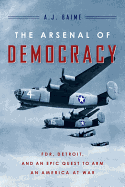
A.J. Baime's sleek, streamlined The Arsenal of Democracy begins with Henry Ford's early years, tracing his meteoric ascension from curious tinkerer to industrial titan. Henry's son, Edsel, rode Henry's first Ford Quadricycle, witnessed the construction of his father's first factories, and was groomed for leadership. Edsel took symbolic control of the company as Henry became increasingly bitter and unstable with age. As their relationship soured, Ford Motor Company descended into squabbling factions--Henry's violent, anti-union security service and Edsel's core of progressive professionals--begetting a leadership crisis on the eve of the company's most important mission.
In the run-up to America's involvement in World War II, President Roosevelt asked the country's industrialists to vastly increase armaments production. The elderly Henry (an anti-Semite, accused Nazi sympathizer, pacifist and personal enemy of FDR) hindered Edsel's attempts build airplane engines for Roosevelt's Lend-Lease program with Britain, which created international embarrassment for the company. But the bombing of Pearl Harbor finally forced Detroit into overdrive. The elder Ford agreed to build the world's largest factory, a small city-sized behemoth called Willow Run, which would apply the assembly-line method honed on the production of the Model T to create B-24 Liberator heavy bombers. Their goal was to churn out a bomber an hour, though labor problems, company politics and Edsel's declining health came close to undermining the project. Baime (Go Like Hell; Big Shots) has given us a wartime history as enthralling as it is accessible, showing that Ford's key wartime role was far from a foregone conclusion. --Tobias Mutter, freelance reviewer

